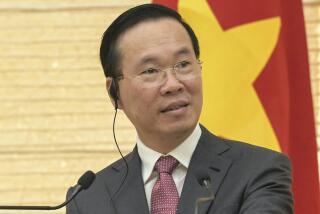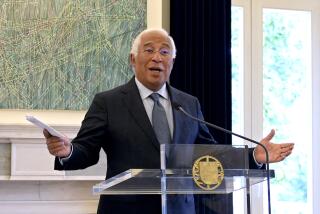India’s Ex-Premier Faces Corruption Charges
- Share via
NEW DELHI — Months of unparalleled allegations of corruption in Indian politics reached a dramatic peak Saturday when a judge ordered criminal charges brought against former Prime Minister P.V. Narasimha Rao in an influence-peddling case.
If Rao is prosecuted, it will be the first time a current or former Indian leader has been dragged into court on charges of committing illegal acts while in office.
Rao, 75, the leader of the world’s most populous democracy until a humiliating election debacle four months ago, protested his innocence but announced that he will resign as president of the Congress (I) Party.
“During the period I was in positions of power, including that of prime minister, I have not done anything violative of law, nor have I done anything which might bring discredit to my party or to my government,” he said in a statement.
Rao, who became prime minister in June 1991, launched reforms that have opened up the economy, but he also presided over what is increasingly held to be the most corrupt government in India’s nearly half-century of independence.
In May, he led Congress to its worst-ever defeat at the polls and lost the premiership.
Since then, shocking allegations about corruption in high circles have dominated the headlines, many of them involving Rao.
On Saturday, a New Delhi judge, Ajit Bharihoke, ordered Rao to stand trial on charges of cheating and criminal conspiracy in a 1983 incident in which an Indian businessman, Lakhubhai Pathak, claimed to have paid $100,000 to secure a government newsprint contract but got nothing in return. Rao was foreign minister at the time.
Rao had asked the judge to cancel an order issued by another magistrate in July making him a “co-accused” in the case along with a controversial former associate, the bearded guru Chandraswami, who allegedly pocketed Pathak’s checks.
Rao said the only evidence against him was Pathak’s complaint.
In his judgment, delivered to a packed court, Bharihoke said he found prima facie evidence of “complicity of the accused [Rao] in the conspiracy to cheat the complainant.”
He ordered the former prime minister to appear in court Sept. 30.
Rao closeted himself with officials of his party and then announced that he was quitting as Congress president “to avoid tension and confusion in the ranks” of the party, which spearheaded the fight for Indian independence.
Rao, who became party president after Rajiv Gandhi’s assassination in 1991, will officially tender his resignation at a meeting Monday of the Congress Working Committee, party General Secretary Devendra Dwivedi said. A provisional successor will then be named. Rao will continue to head the Congress bloc in Parliament, Dwivedi said.
Other party barons, alarmed at the plunge in their party’s popularity and reputation under Rao, had been pushing for his resignation since the initial summons was issued against him in July.
Some have called for his replacement by Sonia Gandhi, Rajiv’s Italian-born widow, as a way to revive Congress’ flagging fortunes.
*
Rao’s political opponents, inside and outside his party, expressed satisfaction at Saturday’s announcement.
“Mr. Rao’s sins are catching up with him,” said Yashwant Sinha, spokesman for the Hindu nationalist Bharatiya Janata Party, the largest party in Parliament.
Bhabani Sen Gupta, a political scientist, said the growing legal problems of Rao and other political figures indicate that the new coalition government of Prime Minister H.D. Deve Gowda is “very clean” and striving to do something about corruption, which many Indians have come to believe is endemic.
More to Read
Sign up for Essential California
The most important California stories and recommendations in your inbox every morning.
You may occasionally receive promotional content from the Los Angeles Times.













